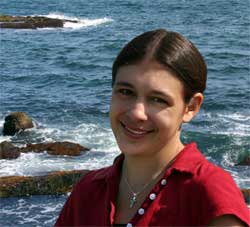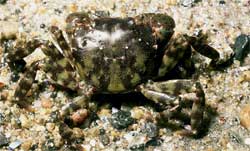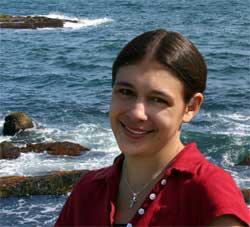 Lincoln resident aims for career as environmental lawyer
Lincoln resident aims for career as environmental lawyer
KINGSTON, R.I. – January 8, 2008 – University of Rhode Island junior Kristen Morito spent the last six months tracking an Asian invader that could have a devastating effect on the health of Narragansett Bay.
In collaboration with scientists at the Narragansett Bay National Estuarine Research Reserve on Prudence Island, the Lincoln resident conducted Rhode Island’s first assessment of Asian shore crabs, an invasive species that was first discovered in New Jersey in 1987 and found its way to Narragansett Bay in the mid-1990s.
“They’re originally from Japan and the east coast of China where they live in the rocky intertidal shoreline,” said Morito, 20, who is studying coastal and marine policy and management at URI. “They’re omnivorous, so they’ll eat almost anything they can get – snails, algae, fish, other crabs. And they’re very aggressive and competitive, which is part of the reason why they are able to take over so quickly. They outcompete our native crabs by pushing them out spatially and eliminating their food sources.”
Last summer Morito spent her days monitoring crab traps on Prudence Island, and what she found was quite alarming — 95 percent of the crabs found in the rocky habitat she studied were Asian shore crabs. While her results were fairly typical compared to other sites on the Atlantic coast, Morito said the crab’s effect on the bay ecosystem could be dramatic.
 “The crabs are adapting very well to this habitat, and it is proving to be problematic because it changes the food web ever so slightly,” she explained. “Unlike the crabs they are displacing, nothing eats Asian shore crabs. As far as we know, there is only one species of estuarine fish, the mummichog, that will even attempt to eat them. Seagulls don’t even touch them. You know something is bad when seagulls won’t even eat them.”
“The crabs are adapting very well to this habitat, and it is proving to be problematic because it changes the food web ever so slightly,” she explained. “Unlike the crabs they are displacing, nothing eats Asian shore crabs. As far as we know, there is only one species of estuarine fish, the mummichog, that will even attempt to eat them. Seagulls don’t even touch them. You know something is bad when seagulls won’t even eat them.”
Unfortunately, the invader is already so abundant that little can be done to eradicate them. “All we can do now is continue to monitor their abundance and other population characteristics, because without extreme and potentially damaging measures, it would be very difficult to even attempt to get rid of them,” Morito said.
“Part of the purpose of my research is to raise awareness of invasive species in Rhode Island so everyone understands the scale of the problem. The Asian shore crab can serve as an example of what can happen if we humans aren’t active in trying to control and regulate aquatic nuisance species,” she added.
Morito’s research was undertaken as part of the URI Coastal Fellows program, a unique initiative designed to involve undergraduate students in addressing current environmental problems. Now in its 13th year, the program based in URI’s College of the Environment and Life Sciences teams students with faculty, research staff and graduate students to help them gain skills that will ensure their future success.
The URI student’s interest in pursuing this project grew from a childhood interest in marine biology and the time she spent on her father’s boat. Subsequently, however, she shifted her career focus slightly.
“Now I would rather work with environmental policy and human interaction instead of the hard sciences,” she said. “I’m more interested in a humanities-based approach to solving marine and coastal problems.”
As a result, after she earns her undergraduate degree in 2009, Morito plans to enroll in URI’s joint graduate program with Roger Williams University that will lead to a master’s degree in marine affairs from URI and a law degree from Roger Williams.
“My plan is to become an environmental lawyer with a focus on marine conservation,” Morito said. “I think that will be the best way for me to make a difference. While the scientists provide the research and information, it’s the lawyers and the legislators who take that information and turn it into actual regulation and policy.”

